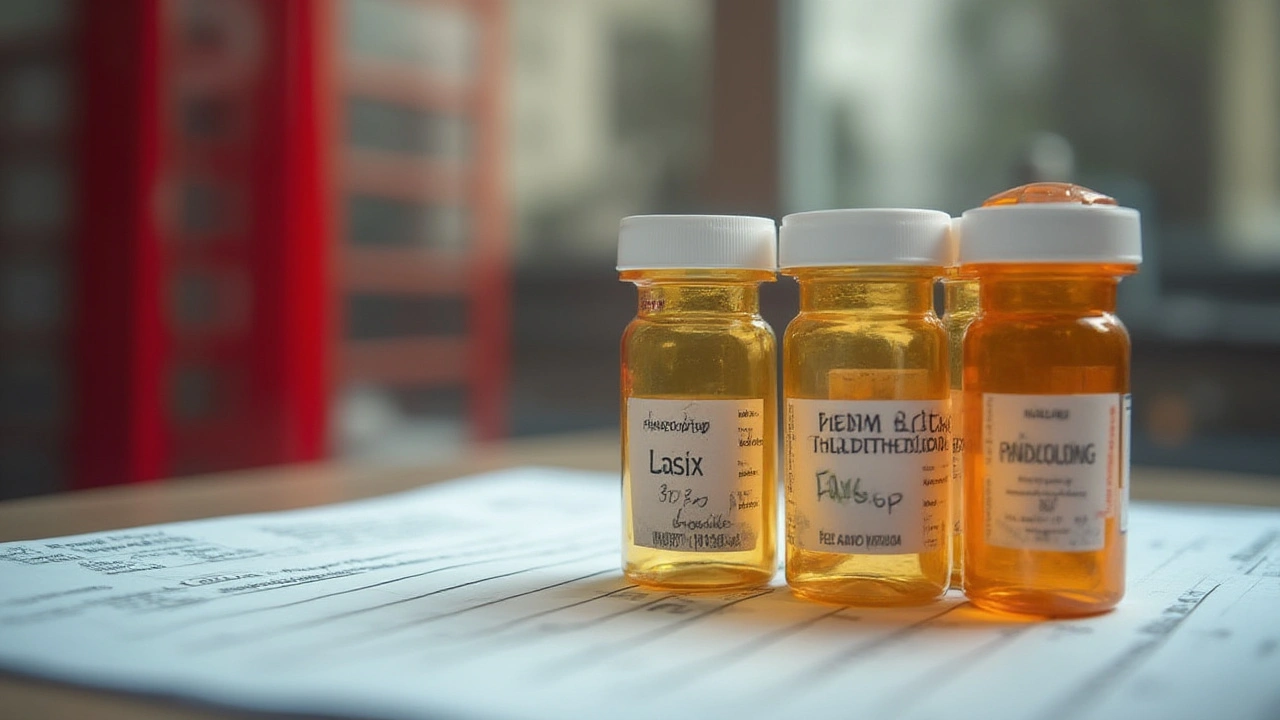Your blood pressure is up, the numbers on the cuff don’t lie, and your doctor is talking about diuretics. Which one? The answer might shape everything from how much you sprint to the bathroom to how long you keep your kidneys happy. If you’ve heard the names Lasix, hydrochlorothiazide (HCTZ), and chlorthalidone flying around, you’re not alone. Sorting out the real evidence behind which one wins for high blood pressure isn’t just a doctor’s task. Armed with the right info, you can push for the choice that really fits your life.
How Do Loop and Thiazide Diuretics Really Work?
Lasix, known generically as furosemide, is the king of the loop diuretics. What does that mean? This drug works in your kidneys, right in the loop of Henle. Picture it as the bouncer at a club, kicking out sodium, potassium, and water with a tough approach. The result: fluid loss, less blood in the pipes, and lower blood pressure. But you pay for this strength—the urgent need to pee, potential dehydration, dizziness, and risk for low potassium can sneak up fast. Hospitals love Lasix for people with heart failure or kidney issues where you need a big and fast fluid dump.
Jump over to thiazide diuretics, and you get a subtler touch. Hydrochlorothiazide (HCTZ) and chlorthalidone both work a bit upstream from the loop—right in the distal convoluted tubule, if you like kidney trivia. They’re less dramatic: they slowly spill out water and sodium, lowering blood pressure with fewer bathroom sprints. Here’s the kicker: thiazides are actually more proven for most folks with high blood pressure and no big heart or kidney problems. They don’t hit potassium quite as hard, though chlorthalidone in particular can sometimes nudge levels down.
Ever heard that not all thiazides are the same? Chlorthalidone lasts longer in the body—like an all-day marathoner, not a quick sprinter. This might mean steadier blood pressure numbers and fewer forgotten doses, but also a tiny bit more risk for that annoying low potassium. HCTZ is shorter acting and often combined with other blood pressure drugs. Both are dirt-cheap, stick around on the PBS in Australia, and have strong evidence behind them.
Check out this simple comparison table:
| Lasix (Furosemide) | Hydrochlorothiazide | Chlorthalidone | |
|---|---|---|---|
| Type | Loop | Thiazide | Thiazide-like |
| Duration (hours) | 6 | 6–12 | 24–72 |
| Blood Pressure Proof | Good in HF, less in primary HTN | Strong in HTN | Best in HTN |
| Pill Price | Low | Very low | Very low |
If you get hit with swelling (edema)—like after heart problems, bad kidneys, or liver disease—Lasix or other loops are the heavy artillery. For classic, garden-variety high blood pressure, thiazides almost always win, unless your kidney function is shot (usually an eGFR under 30 mL/min/1.73m², if you’re reading the fine print on pathology results).

What’s Behind the Evidence—Comparing Lasix, Hydrochlorothiazide, Chlorthalidone
The easy thing would be to say "any diuretic will do," but the science keeps throwing curveballs. Randomized trials like ALLHAT (A large U.S. government study) put chlorthalidone right in the bullseye for best outcomes—less heart attacks, fewer strokes—compared to ACE inhibitors, calcium channel blockers, and yes, even other thiazides. The reason? Chlorthalidone’s long action means steadier blood pressure control around the clock, closing the gap left by drugs that wear off by dinnertime.
Hydrochlorothiazide, meanwhile, is everywhere on pharmacy shelves. It lowers blood pressure, but when you line up all the studies, it doesn’t reduce heart attacks and strokes as well as chlorthalidone. Doctors still use it, often in combination pills, because side effects are mild and it does the job for a lot of people. But if you want every possible tick in the "avoiding heart attack" box, chlorthalidone pulls ahead.
Lasix gets thrown at patients with big swelling and in hospital settings, but outside of that arena, it lags behind in the research races for primary hypertension. If your kidneys are healthy and you’re not carrying around loads of extra fluid, a loop diuretic is likely overkill. It’s kinda like using a firehose to water your indoor plants—messy and not the best fit.
It’s worth pointing out some “real world” details about these meds. Even though thiazides are super effective, they aren’t magic for everyone. There are genetic differences—people with African or South Pacific backgrounds often get extra blood pressure-lowering out of these drugs. On the flip side, some folks see their uric acid and blood sugar tick up, so doctors keep an eye on those numbers, especially if you have a history of gout or borderline diabetes.
A handy tip from the evidence: if you’re trying to avoid cramps, muscle weakness, or palpitations, ask about potassium monitoring. Lasix’s big risk is a potassium wipeout, especially if you’re also taking digoxin or certain antiarrhythmic drugs. Chlorthalidone and HCTZ can do it, but usually more slowly and gently, unless you’re taking bigger doses.
Curious about other strategies that might work when traditional options don’t cut it? Check out these Lasix alternatives—it’s good to know your full set of choices if you’re battling edema or complicated blood pressure stories.

Real-World Tips for Choosing the Best Diuretic for High Blood Pressure
If you’re standing in front of the pharmacy shelves, trying to make sense of what goes into your routine and what gets tossed, the little details matter. Let’s run through some bite-sized, evidence-backed advice for picking your path:
- Stick with a thiazide unless your kidneys are really struggling or you absolutely need major water loss fast. For most people, **thiazide diuretics** (especially chlorthalidone) lower blood pressure best and reduce real-world risk of nasty outcomes like stroke and heart failure.
- Ask your doc about combining low-dose thiazide with another blood pressure medicine if just one tablet doesn’t quite do the trick—often this means fewer side effects and steadier control compared to cranking up a single drug.
- Watch your potassium and sodium numbers. Even if you don’t feel different, sneaky low or high electrolyte levels can crop up. Most folks do just fine after the first few weeks, but repeating labs is smart, especially at the start or if you up the dose.
- If cramps, frequent peeing, or dizziness hit hard, don’t tough it out. Sometimes a small change in timing (taking pills in the morning), dose, or even brand can make a huge difference.
- Try not to ignore habits outside the pillbox. Cutting back on salt, limiting alcohol binges, and getting more exercise can make diuretics work better, at lower doses.
- If you have diabetes or gout in your history, mention it—sometimes thiazide tweaks can push blood sugar or uric acid higher, and some people notice it with even a mild dose.
- Hydrochlorothiazide may be more convenient if you like combo pills, but push for chlorthalidone if you want the purest evidence for protection against heart events.
Interestingly, the most recent Australian guidelines tilt toward thiazide-like diuretics (meaning chlorthalidone or indapamide) as a first choice when a diuretic is needed. This lines up with what’s been shown in major trials, but every individual comes with different risks. If you have kidney disease with an eGFR dipping under 30, or you’re swollen from heart or liver trouble, your doc might go with a loop like Lasix for bigger effect.
If you’ve already been on Lasix or another loop and things are working, don’t freak out—sometimes the best fit for you is the one that keeps you feeling well and out of hospital. What matters most is keeping blood pressure within target, not chasing the latest headline. That said, if you ever feel short of breath, get dizzy, or seem to be running to the loo every hour, flag it. Sometimes the smallest tweaks in your medicine routine can fix a week’s worth of grief.
There’s zero one-size-fits-all answer in blood pressure care, but after you break it down, thiazides—especially chlorthalidone—carry the heaviest evidence for long-term safety and hard outcome wins. Hold onto that if you’re ever caught between options.

Amanda Devik
July 18, 2025 AT 03:10This is such a vital discussion, especially with how confusing the options can be for managing hypertension! Thiazides like hydrochlorothiazide and chlorthalidone often come up as go-to choices, but the realities get wild once you dive into efficacy and side effect profiles.
Did you know that chlorthalidone has a longer half-life and potentially better outcomes for reducing cardiovascular events? It's not just about blood pressure numbers but really controlling the risk downstream. But loops like Lasix are gold in fluid overload situations—think heart failure or advanced CKD—so context really drives your choice!
For anyone juggling these medications: monitoring electrolytes, especially potassium and magnesium, is paramount. And if you ask me, polypharmacy means keeping a sharp eye on drug interactions. You gotta stay on top of it all if you're managing HTN smartly.
Also, lifestyle tweaks are underrated but critical to work alongside meds. Water intake adjustment with diuretics? Salt moderation? Game changers. This conversation needs to get louder so patients and clinicians can make evidence-backed choices without huge confusion clouds hanging over them.
Mr. Zadé Moore
July 19, 2025 AT 20:33Honestly, the obsession with thiazides sometimes borders on dogma. While it's true that chlorthalidone edges out hydrochlorothiazide in morbidity outcomes, the blanket prescribing habit ignores individual patient variability.
Loop diuretics like Lasix absolutely have their place, particularly when sodium retention is rampant or in cases of impaired renal function where thiazides falter. And let's face it—blinded allegiance to guidelines without dissecting patient nuances sets a dangerous precedent. One-size-fits-all rhetoric belongs in the past.
Really, relying on only side effect profiles and convenience without rigorously challenging indications is intellectual laziness. We must pivot toward precision prescribing grounded in robust clinical judgment and individualized pharmacodynamics instead of wholesale adherence to populist standards.
Brooke Bevins
July 21, 2025 AT 17:00Hey everyone! Just jumping in because I’ve been dealing with hypertension for years and tried both classes.
To me, thiazides seemed gentler but gave me muscle cramps, and loops felt more intense but helped when my swelling kicked in. 🥴 Has anyone else felt like that? It’s kinda frustrating when the side effects feel like a trade-off you just have to live with.
Also, through experience, I learned how important it is to communicate clearly with your doctor about how you're feeling on these meds because sometimes they just adjust doses or switch medicine without really digging into side effects.
Would love to hear if anyone found ways to mitigate cramps or dryness? It’s all about quality of life for us!
Vandita Shukla
July 23, 2025 AT 10:40While these opinions are somewhat entertaining, the evidence is clear when properly reviewed. The potent natriuretic effect of loop diuretics leads to more rapid and pronounced volume depletion, which is often unnecessarily aggressive for routine hypertension management.
Thiazide diuretics exert their antihypertensive effect largely through vasodilation and sodium excretion but have superior evidence supporting morbidity and mortality reduction in large randomized trials.
I recommend reviewing ALL available studies including ALLHAT and subsequent meta-analyses before advocating for loop use outside narrow clinical indications. Knee-jerk clinical opinions without rigorous data inspection do a disservice to patient care. Knowledge is power people.
Susan Hayes
July 24, 2025 AT 22:13@Vandita you absolutely nailed it! It’s incredible how many folks just jump on the Lasix bandwagon when the data clearly favors thiazide diuretics for long-term hypertension control.
But I have to say, the dramatic flair around loop diuretics sometimes ignores one crucial aspect — the potential electrolyte derangements that can spiral out of control and mess with cardiac rhythm. It’s a dangerous game to gamble with too much volume depletion in stable hypertensives.
Honestly, if you’re not monitoring labs religiously, this can become a nightmare real quick. We owe it to patients to promote smarter, safer prescribing and most importantly, national standards that don’t waver under flashy marketing.
NIck Brown
July 29, 2025 AT 16:40All this debate ignores a huge clinical truth: the patient’s individual profile must dictate therapy.
Blunt comparisons between Lasix and thiazides miss nuance like comorbidities, renal function, and even race-based responses to diuretics. Black patients, for instance, tend to respond better to thiazides plus calcium channel blockers.
The evidence base is complex but accessible, and any prescriber worth their salt is tailoring choices accordingly. We need less armchair declarations and more patient-centric clinical reasoning.
John Magnus
August 2, 2025 AT 04:00Great points so far, and I'd like to add some pharmacological insight here. The mechanism difference plays a critical role.
Thiazides inhibit the Na-Cl symporter in the distal convoluted tubule, leading to mild diuresis and vasodilation via direct effects on vascular smooth muscle. Their effect on potassium wasting is moderate but significant over long-term use.
Loop diuretics target the Na-K-2Cl transporter in the thick ascending limb, causing a profound diuresis yet higher potassium loss and risk of hypovolemia. So from a pharmacodynamic standpoint, loops are perfect when volume overload is a big concern.
Therapeutic strategy should balance disease context—hypertension vs heart failure or CKD—while constantly monitoring labs to avoid dangerous side effects.
What do others think about combining low doses to get benefits and reduce risks?
Michelle Thibodeau
August 10, 2025 AT 06:27I love how this thread is diving deep into the heart of hypertension management. Just to sprinkle some perspective, what often gets missed in clinical discussions is how patient lifestyle and socioeconomic factors influence therapy choice.
Accessibility, cost, and compliance with once-daily dosing (where thiazides shine) often determines effectiveness outside clinical trials. Plus, adverse effect profiles impact adherence hugely. If a patient experiences relentless cramps or frequent urination disrupting work or sleep, that might lead them to abandon regimens altogether.
Empathy in prescribing means weaving these real-world elements into evidence-based approaches wherever possible. We can talk all day about drugs, but it's the lived experience that ultimately shapes outcomes.
Courtney The Explorer
August 14, 2025 AT 07:40Not to stir the pot but we should also consider the shifting landscape of hypertension guidelines and emerging data! The old idols—hydrochlorothiazide and Lasix—may soon have competition from newer agents and combination therapies.
We’re seeing more trials emphasizing metabolic side effects with thiazides like increased glucose intolerance and lipid perturbations. The kidney-friendly profile of loops might get reconsidered in this light, especially in diabetics.
It’s vital to remain vigilant, not just stick to tradition blindly. Science continuously evolves, and our prescribing should flex accordingly.
Ashleigh Connell
August 16, 2025 AT 15:13What a fantastic exchange of expertise! Just to add, while the evidence skews thiazides as the champion for uncomplicated hypertension, patient values and preferences also deserve weight here.
For example, some patients prioritize avoiding frequent urination which is more pronounced with loops, even if medically appropriate in certain conditions. Or others worry about thicker ankles from thiazide-induced sodium retention wanting something more aggressive.
Good medicine honors not only the numbers but the whole person, involving them in nuanced decisions instead of dictating a drug. That’s where true healing and sustained control comes from.
Mike Gilmer2
August 17, 2025 AT 02:37This has been an epic discussion! Just last month, my cardiologist emphasized a targeted approach based on my kidney function and how I respond to meds.
They started me on chlorthalidone for my stubborn BP, but because of slight electrolyte dips, added a low-dose loop later. It’s really about the art of medicine, balancing act between trials and the individual war stories.
For fellow patients, don’t hesitate to ask about these nuances. Doctors love science but your input can guide them toward personalized regimens. Definitely advocate, educate yourself, and remember it's not static, just like science and you.